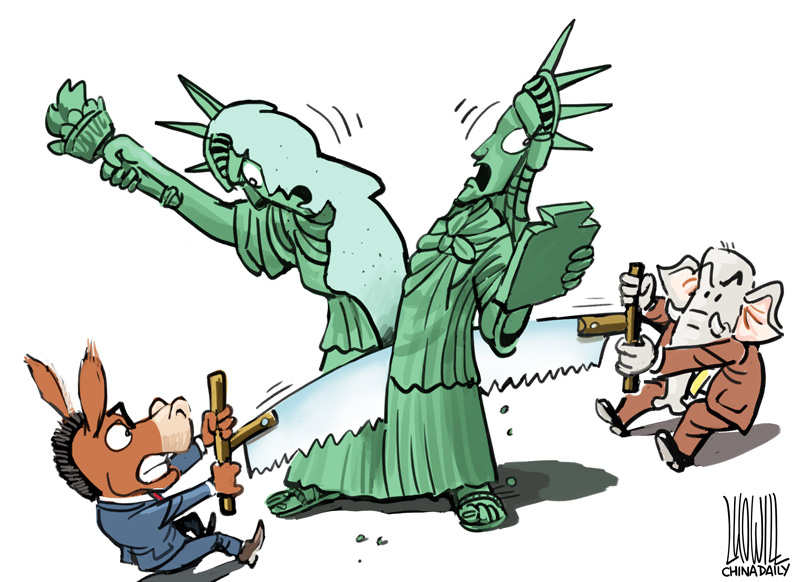US wall diverts focus from domestic issues


The government shutdown in the United States, which began on Dec 22, 2018, has affected the functioning of nine agencies including the Department of Homeland Security and Department of Agriculture, and disrupted the normal life of more than 800,000 federal employees. The current shutdown is the longest in US history, surpassing the one during the Bill Clinton administration which lasted 21 days because of the disagreement on whether to cut government services. And there is no sign it would end soon.
US President Donald Trump's proposal that the US Congress fund the $5.7 billion wall on the US-Mexico border is at the crux of this shutdown. Trump is adamant on building the wall, because he believes it would prevent illegal immigrants from entering the US. It is also one of his campaign promises. But the Democratic Party-controlled House of Representatives is opposed to the plan.
House Speaker Nancy Pelosi has called off the negotiations with Trump on the issue, with the House agreeing to allocate less than $1.3 billion to resolve the border security issue.
Since assuming office in January 2017, Trump has faced many problems, reshuffling his administration time and again to resolve domestic and foreign issues, and his standoff with the Congress is no different. The US government has experienced several shutdowns since the end of the Cold War, which can be attributed to the US' two-party political system with both parties seeking to win votes by making promises to the electorate.
Normally, a country's social welfare is based on economic growth. But the US is yet to overcome the problems created by the 2008 global financial crisis. Former US president Barack Obama implemented four rounds of quantitative easing measures to resolve the problems, but they ended up harming the economy. As for Trump, he won the presidential election by vowing to put the US economy back on the right track, but he has not succeeded in honoring his promise.
The impact of the government shutdown shouldn't be underestimated. For example, Beth Ann Bovino, chief economist of Standard & Poor's, said the shutdown will cost the GDP dear. The shutdown has already hurt the people by depriving employees of their full salary, and sparked public protests, with one taking place in Washington DC. It has affected the US' foreign policy, too, with Trump pulling out of the World Economic Forum in Davos, Switzerland, which means compromising the country's role in influencing the world economy.
Trump may believe the root cause of all US problems is its porous southern border, and building a wall on it will solve all of them. But he does not realize the political differences over the wall signifies the political polarization and increasing contradictions between the Republicans and Democrats. In a way, Trump's promise to build the wall is part of his populist politics. And the impasse in the Congress is less due to the Democrats' opposition to the wall plan and more because of the uneven distribution of profits among the interested groups.
If democracy seems to be functioning well in the US, it is the result of its global hegemony, which allows it to trigger wars in foreign countries, such as the Gulf War, the Iraq War, the invasion of Afghanistan and the civil wars in Libya and Syria, to fulfill its own narrow goals. The US also used the 1997-98 Asian financial crisis and the Argentina and Turkey financial crises to its own advantage.
History shows that to break a deadlock in domestic politics, the US has almost always chosen to sacrifice innocent victims overseas. When US political elites cannot solve the country's domestic problems, they tend to divert American people's attention to external issues. The wall, too, seems to be a ploy to divert the attention from the serious domestic problems the US faces, which the Trump administration doesn't know how to solve.
The author is a professor of international studies at Renmin University of China.


































